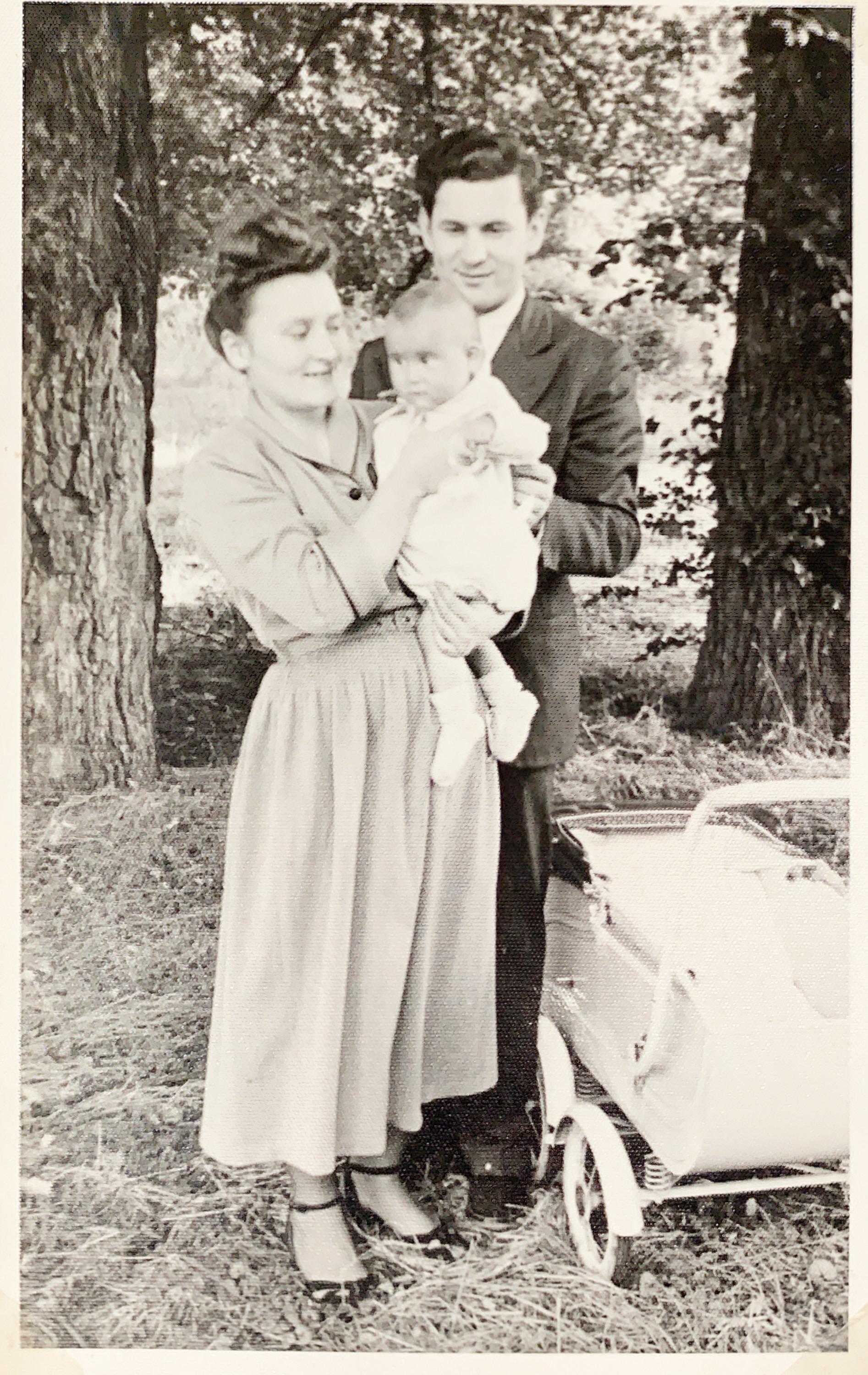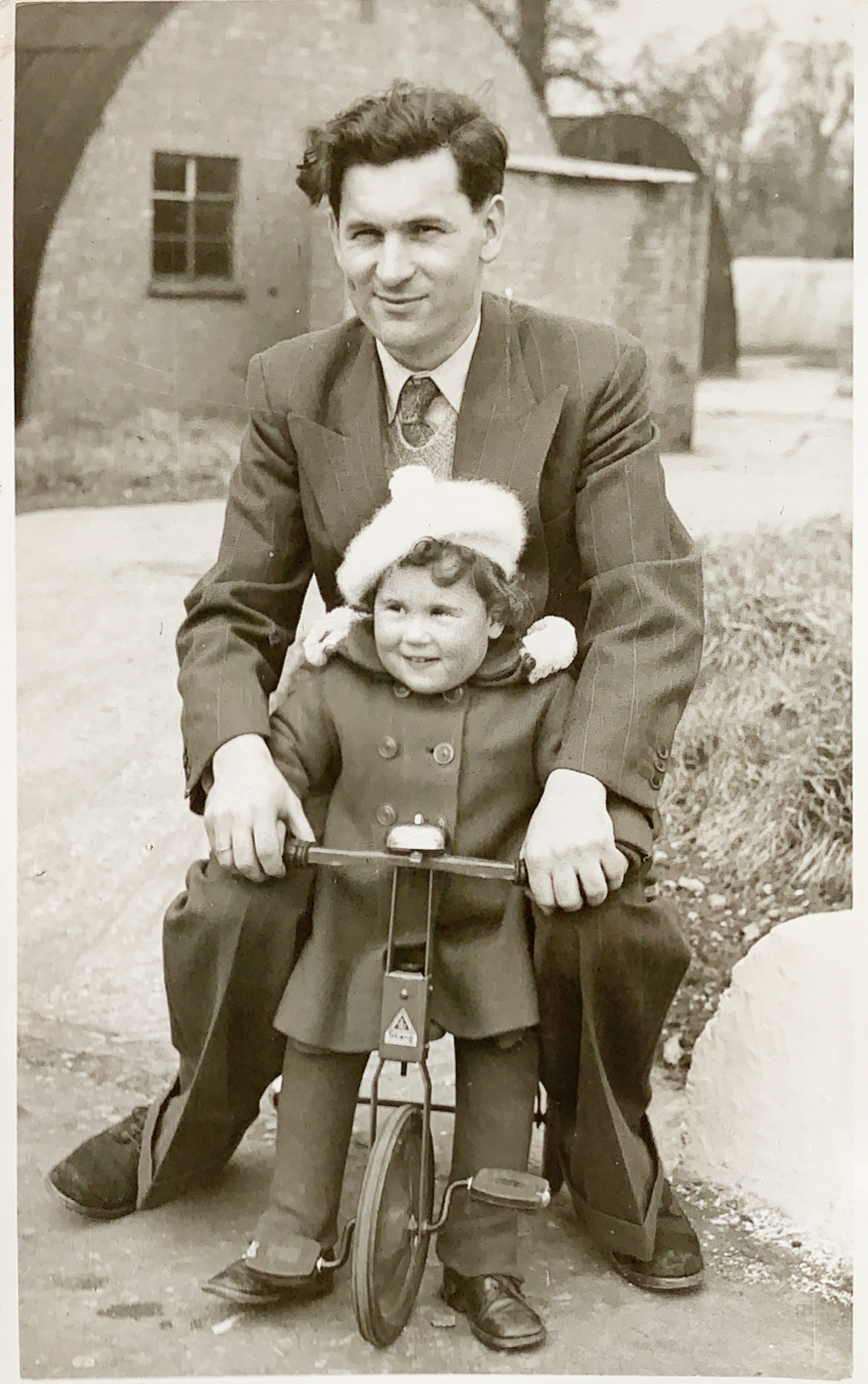MEMORIES FOUND IN A STEAMER TRUNK
by Ewa Barczyk
.jpg)
This steamer trunk (kufer) traveled with my parents and me from Liverpool England to New York City in 1952 aboard the Cunard Line ship Franconia. The trunk was supposedly built by my father and a friend in Diddington where we lived on a school campus in a Polish Resettlement Camp where my dad taught. All my parents’ possessions where placed in the trunk for safe passage. I do remember there were several heavy pots and pans, my Mom's white wedding shoes, a couple of elegant handmade dresses, a photograph album documenting my childhood in England, and an album of pencil sketches of the destruction of Warsaw, my Mother's birthplace. Despite asking many times about the artist, my mother always claimed she did not recall who he was, so we were left to create our own theories. Also in the trunk were my father’s books in Greek and Latin; his report card from the University of Vienna during the war with a photo of him wearing a clerical collar and cassock; papers issued by the Nazi government that certified that he had been injured in Vienna during an Allied bombing in February 1945; a letter from the director of a seminary in Graz at the end of the war to General Anders in Italy asking that my father be released from army responsibilities so that he could resume his studies in the seminary; pamphlets printed by the Polish Army for the soldiers serving in Rome and Ancona; a single piece of paper signed by many teachers testifying that my mother had completed several business courses while in the last POW camp she was interned in Oberlangen; papers from the Polish government in exile certifying that my mother had fought in the Warsaw Uprising and from the Polish Government in Exile Ministry of Education testifying that my Dad completed the necessary courses for him to teach a school for former Polish soldiers in Diddington near Cambridge; and a white silk parachute -- I recall there was a thin red stripe in the parachute.
So many unexplained objects were held in this trunk — these were all that remained from their previous lives as they left Poland. I wish I could weave a full story of my parent’s lives from these random papers. Neither my siblings nor my mother knew why my father was at the university in Vienna while in the seminary studying to be a priest and how his army service fits into this picture, other than being told by family that the Nazis were searching for him in his hometown so he was smuggled out to Vienna. He mentioned that he would help transport people across the mountains to safety. We do not know which mountains, who he was saving and where he delivered them. He told me he took an oath of secrecy and allegiance and could not tell us what he did during the war. Even though he lived until his 96th birthday, he would not break his promise. He enlisted in the Polish army and left at the start of the war and did not return until the 1960’s. He left the seminary sometime after the end of the war and eventually joined other Polish soldiers in England by 1947 and was involved with the Polish Government-in-Exile in London in establishing schools for Polish soldiers arriving in England. He met my Mom in London at a Polish Club where she settled after arriving with army transports from Ancona, Italy with the Polish II Corps under Gen. Anders likely in 1946. I have found much written about the Polish Resettlement Camps created by the British Government to absorb the demilitarized Polish soldiers and their families who chose not to go back to a Communist Poland. In 1949, the Committee for the Education of Poles turned an American war hospital, then Polish hospital, into a co-educational Polish Secondary Modern Boarding school with over 300 students, many who arrived from Siberia via the Middle East or Africa and their studies had been interrupted by the war. I was born in a hospital in Cambridge, shortly after the camp was started. We lived in corrugated metal Quonset or Nissen huts, which were called “beczki” or barrels by the residents. They were divided in half and each side was assigned to a teacher and family. I recall we had a coke burning cast iron stove in the middle which I was told to never touch so I had a big fear of such stoves.
 |
 |
For more information on this and other camps, see: https://www.polishresettlementcampsintheuk.co.uk/diddingtonschool.htm
My parents decided that there would be more opportunities in the United States for me and the British government was giving free passage for Poles to resettle elsewhere. The steamer trunk traveled by train with us to Liverpool and then to New York aboard the Franconia. Ellis Island ship registries do state that the three of us arrived in January 1952 with a trunk and two suitcases. The trunk was with us for a while in New York and then briefly in Connecticut while my father looked for work before deciding Chicago held more promise and where many of their friends resettled.
A word about my mother’s papers which are more self-explanatory. She fought with the Home Army (AK) in the Warsaw Uprising in 1944 and was shipped out in cattle cars with the soldiers after the Germans crushed the uprising being marched to several camps as the war front shifted. Oberlangen, near Holland, was her last imprisonment – it was the only female P.O.W. camp in Europe but the conditions were extremely hard. On April 12th, 1945, the camp was freed. My mother would tell us, with tears in her eyes, about this unbelievable day when all the German guards ran away into the forest when they heard that a British army division was approaching. Much to the women’s amazement, the soldiers in British uniforms were Polish soldiers of Gen. Maczek’s 1st Armoured division, along with Gen. “Bór” Komorowski, who was commander of the Warsaw Uprising. My mother along with many others, went to Ancona Italy where Gen Anders army was located where they could find a safe place to stay. How she got there over war torn Europe is another story.
See my Mother's bio note: https://www.1944.pl/powstancze-biogramy/zofia-kusmierska,26063.html and interview: https://www.1944.pl/archiwum-historii-mowionej/zofia-barczyk,3383.html
I recall the trunk lived in a large walk-in closet in our house and I would sneak in there occasionally to admire and try on my Mom's old but still lovely clothes. So, what happened to these items? My Mom turned the parachute into a pretty dress for me which I wore to Church and in the Corpus Christi procession in Diddington but it got some burn holes in a house fire shortly after we got to Chicago so it was discarded at some point after my younger sister’s wore it as well. My mother's papers were donated to the Uprising Museum in Warsaw where she has an oral history on file, the wedding shoes got ruined in a flood in their basement, the war pamphlets were donated to several university libraries and museums, and I still have some of my father’s books and papers. I still have hope that I can do more research in trying to add more to his wartime story. The trunk represents the conclusion of my parent’s odyssey which began during WWII. I wish I had asked my parents more about these things while they were still alive, but they lived for the future and did not like to dwell on the past. Thus, the trunk, which still has a sticker indicating Cunard Line, remains in my house as a gentle reminder of the dreams that led my parents to pursue a new and better life in America seven decades ago. Sadly, I will never know the full stories of all these objects, but I cherish them for their rich history.